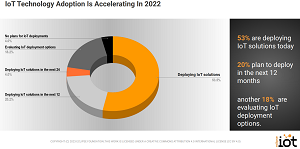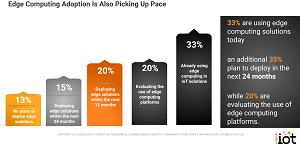News
Eclipse Foundation Charts Rise of IoT/Edge Deployments, Lists Recommendations
Internet of Things (IoT) and edge computing deployments are on the rise across the board, says a new report from the Eclipse Foundation, which listed vendor-neutral recommendations for organizations getting in on the action.
According to the open source champion's new IoT & Edge Commercial Adoption Survey Report 2022, most respondents (53 percent) to a survey say they currently deploy IoT solutions, with 24 percent planning to do so within the next 12 to 24 months, while 18 percent were currently evaluating deployments.
 [Click on image for larger view.] IoT Growth (source: Eclipse Foundation).
[Click on image for larger view.] IoT Growth (source: Eclipse Foundation).
On the edge computing side, the numbers are similar: 53 percent of organizations either utilize or plan to utilize edge tech within 12 months, while another 20 percent are currently evaluating deployments.
 [Click on image for larger view.] Edge Growth (source: Eclipse Foundation).
[Click on image for larger view.] Edge Growth (source: Eclipse Foundation).
What's more, the report notes a shift toward higher investments for both IoT and edge, along with a trend toward a larger number of IoT/edge assets managed per deployment.
The report's objective is to gain a better understanding of the IoT and edge computing ecosystems by identifying the requirements, priorities and challenges faced by organizations that deploy and use commercial solutions, including those based on open source technologies, the organization said.
Other highlights of the report as presented by the foundation include:
- Organizations in 2022 continue to see the use of IoT/edge technologies as strategic (spending decisions are being driven at the executive level 38 percent of the time)
- Open Source plays a major role (73 percent of organizations factor open source into their deployment plans)
- The top three benefits of open source according to respondents include: the ability to customize or influence code in projects (30 percent); flexibility (22 percent); as well as cost advantages (16 percent)
- The most common operational challenges for the IoT & edge are: 1) connectivity; 2) security; and 3) data collection & analytics
- There is an increased tendency towards a Hybrid cloud strategy (42 percent of respondents suggest that IoT deployments are using, or will use a hybrid cloud)
Along with numerous charts and graphs depicting all of the above, the group also provided these recommendations to organizations, providers and vendors:
-
Enterprises:
- Select vendors and service providers that embrace open standards and the use of customizable, production-ready open source building blocks. Open source enables scalability and flexibility in IoT and edge solutions, while avoiding the lock-in and cost issues associated with proprietary solutions.
- Support vendor-neutral IoT and edge computing ecosystems if they wish to actually benefit from open source over the long term. Contributing to relevant open source projects and communities will help their employees develop valuable skills, while ensuring the long-term viability of those projects and communities.
-
Solution providers:
- Incorporate open source platforms that are capable of running seamlessly across the whole edge-to-cloud continuum, with a focus around hybrid, multi-cloud and private cloud offerings that enable customers to avoid using a public cloud for their mission-critical data.
- Add edge computing into their offerings. Edge computing offers many benefits, including reduced latency, bandwidth savings, and system resiliency. To stay competitive, solution providers absolutely need an edge computing strategy.
-
Platform and software vendors:
- Implement data security and sovereignty solutions across devices and applications. Organizations must pay particular attention to their ability to retain control over data flow and storage, e.g. for data gathered from IoT sensors and devices. Moreover, they need to guarantee the privacy and integrity of customer data.
- Create offerings that optimize certain workflows and/or mitigate specific challenges. There is already a wealth of generic platforms and technologies available in the market. To achieve differentiation, organizations need to develop features and capabilities that set them apart.
The online survey was conducted starting April 1, 2022, and ending June 15, 2022, with 261 individuals participating.
About the Author
David Ramel is an editor and writer at Converge 360.